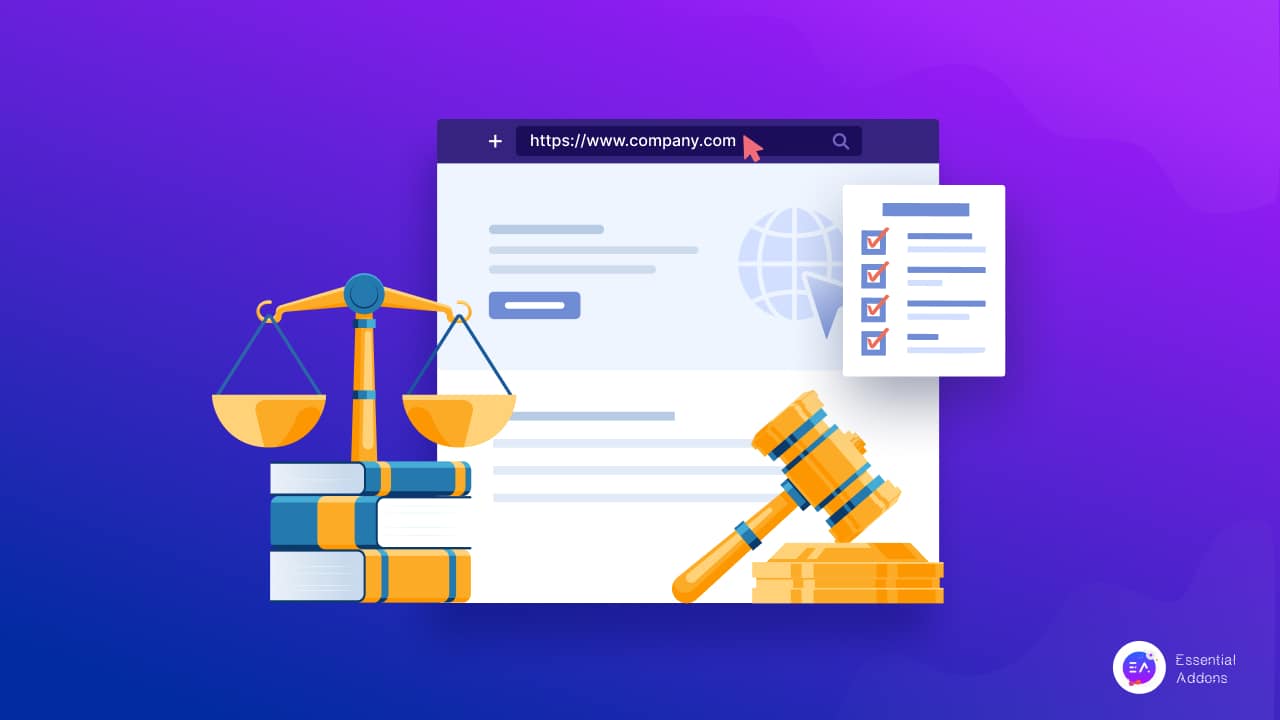Creating your website does not require much these days, but there are some lawful rules and regulations that you must adhere to. Every web creator must be conscious of these to avoid further complications that may arise due to not following the legal requirements of websites. Here, in this blog, you will learn about the ‘Website Legal Requirements’ and top tips to ensure compliance.

Reasons Why Web Creators Must Know Website Laws
It has become so easy to create websites that people with no knowledge of coding can also design professional looking web pages. However, you can not simply start creating a website, there are some website legal requirements that you must keep in mind. The requirements may overwhelm you at first, but the consequences of not adhering to them can be even more overwhelming. But do not worry, with this complete guide, we are here to help you understand everything you need to follow.
Web designing requires extensive technical, innovative, and marketing skills. Given the amount of expertise mastering web design requires, it’s understandable that being aware of the ‘Website Legal Requirements’ may seem burdensome to many. But as you construct websites for your clients, you need to have full concentration on the legal requirements of websites, unless you want to face dire consequences. This is a crucial part of operating a web design business or firm.

A mishap or misstep may cause both you and your client trouble if you do not work by the ‘Website Legal Requirements’ while building the website. You need to make sure that your clients (and yourself) do not fall into any legal issues.
You might be more likely to get the contract if you present yourself as a credible designer who can help guarantee that the website you build complies with legal criteria. This is because when you bring forward the website proposal, there are probabilities of other designers being considered as well. So being able to effectively communicate that you are conscious of the ‘Website Legal Requirements’ when proposing to construct the website will be a differentiating factor for your business. The fact that the website you build does not bring legal risks for your client sets you aside from others & makes you more reliable in the eyes of your clients instantly.
Legal Requirements For Websites That Have Impacts On Your Business

By now, it must be clear how important is to know the legal requirements of websites. You may be wondering what these rules and regulations are; do not worry because we have you covered. Below is the list of Website Legal Requirements that web creators must know and follow.
Privacy Policies and Data Collection
The fundamental guidelines for legal compliance are privacy laws. Policies typically start by stating that data is being gathered, then go into greater detail about the different categories of data that websites may gather and how users can access them to gain control.
So, you need to inform the users of the type of personal information you collect, and how you use and share those. You will also have to disclose the use of third-party services and let users know how they can control their data. The users need to know whether they are being tracked or how.
Notices Of Cookie Consent
Your website must not skip a cookie policy and consent notice. Despite the fact that the European Union (EU) passed the General Data Protection Regulation (GDPR), it applies to all websites that receive visitors from the EU. So, a cookie policy and consent notice must be present on your website, regardless of where you are operating your website from. According to GDPR, your website visitors need to have the option or freedom to accept or decline the usage of cookies.
Recommended Reading: How To Create A GDPR Cookie Consent Notice In Elementor?

Did you know you can easily create a GDPR cookie consent notice bar without any coding in Elementor? With the help of advanced marketing plugins like NotificationX, which comes with seamless integration with Elementor, you can create stunning notification bar in WordPress in a matter of minutes and use it to show your GDPR notice. Check out the complete guide on how to show a GDPR notice in WordPress here.
Information Of Your Company
Forming relationships of trust and authenticity with customers, and adhering to website legal standards are both reliant on how you position yourself as a credible source of certain products and services. For that, providing detailed information about your company (or, yourself) is another important thing that you must take into account. Company name, address, contact details, etc. are some basic information that you should share.

Plagiarism and Copyright Laws
Another crucial factor for any business website is copyright and protecting its intellectual property. You should include a copyright notice in the site’s footer to safeguard your company against copyright violations that occur when someone copies and reuses the content from your website.
The year the first-ever website was established, the words “copyright” or “copr,” and the name of the owner(which would be the business name) are all required for the copyright notice to be considered legally binding. While working on a website project, the majority of web designers will automatically insert this in the footer of the site.
Make sure that any content you get from a client for their website does not violate the copyright of another website or business. This includes any web material your customer may have plagiarized as well as any pictures they may have acquired from Google Image Search.
If a website contains illegal material, a DMCA request may be made to have it removed from search results and perhaps even the server it’s hosted on. It might even lead to legal action.
Terms & Conditions
The terms and conditions of your website must be stated clearly on your website. Though this is not a mandatory website legal requirement, the “Terms Of Use And Conditions” page describes the guidelines for using your website. The terms and conditions vary depending on the type of website you are creating, so we recommend that you be careful about what you include. There might be different regulations applicable to different websites, but in general, they might include the following:
📌 Disclaimers: A statement disclaiming liabilities for the accuracy of third-party narrations, limiting responsibilities in case of errors or content that is not suitable for certain purposes.
📌 Copyright: Any kind of website ought to have a copyright and trademark notice, if relevant. Copyright@2017yoursite.com is one example.
📌 Your privacy policy may also be found on the Terms and Conditions page.
📌 Bring up the rules that govern disputes. You can also mention from what country, state, or province your website is run.
Disclaimers
Disclaimers are to unambiguously exclude the owner of the website from any kind of legal liability that may arise while using the site. Disclaimers may sometimes overlap with terms and conditions that can be included in the terms and conditions as well. However, disclaimers also vary based on the type of site and can
👉 State that it is not allowed to use your original content without your permission;
👉 Hold that the owner of the sites has their own opinion;
👉 State that the website’s content is not any sort of professional advice but rather informational;
👉 Disclaim accountability for users’ decisions made based on the site’s content;
👉 Highlight that site’s content from advertisers and third parties is not subject to liability.
HTTPS Extension

To safeguard the sensitive and personal information of the customers of your eCommerce website, there’s no alternative to take precautions. So, you must focus on the safety and security measures to protect the private information of your customers. For eCommerce websites, HTTPS (Hyper-Text Transfer Protocol Secure) is necessary to be employed.
HTTPS is the secure version of HTTP that is used to convey information between a user’s web browser and a website. Customers trying to purchase on your website may have their financial information exposed if HTTPS isn’t used.
GDPR
You must adhere to the stringent privacy regulations established by the General Data Protection Regulation (GDPR) if you own an eCommerce website or a website that sells goods or provides services to people who live in the European Union, Island, Norway, Lichtenstein, Switzerland, or the United Kingdom. This also applies to websites that get traffic from EU regions. A comprehensive privacy policy that describes what, how, when, and where data is gathered is the first step in adhering to the GDPR. If any of the GDPRs are violated, there are massive financial penalties.
CalOPPA
Other legal requirements for websites include abiding by the terms of California’s Online Privacy Protection Act and the fundamental GDPR. The California Online Privacy Protection Act (CalOPPA) was passed to safeguard Californians’ right to privacy and “personally identifiable information”. As a result, CalOPPA must be complied with by any website that is situated in California or receives visitors from Californians.
Your privacy statement must directly link to the word “privacy” from the website’s home page and list the parties involved in data collection. It is required for websites to protect the users’ “personally identifiable information”. This information includes,
✅ First and last name
✅ Physical address
✅ Email address
✅ Contact Information
✅ Social Security number
✅ Phone Number
✅ Date Of Birth
✅ Physique Details, height, weight, and hair color
✅ Information that identifies an individual
A website’s privacy statement must make clear what information is gathered and retained to comply with CalOPPA. It must mention the third parties who are sharing the information, tell users how to update their information on your website, guide customers on how to stay informed of site privacy policy updates, and specify the most recent time the privacy statement was updated. A privacy statement must, according to CalOPPA, tell in detail how customers can request not to be tracked. However, websites are not required by law to honor a user’s DNT setting.
The Americans with Disabilities Act (ADA)

The Americans with Disabilities Act (ADA) is a U.S. law enacted to abolish all discrimination based on disability. For people with disabilities, websites must adhere to several requirements mandated by the Americans with Disabilities Act (ADA). It follows that your website and all other electronic content must be accessible to all including those with disabilities and usable by them. Any website owned by a company with at least 15 employees and running for more than 20 weeks out of the year must abide by the ADA.
Industry-Specific Website Legal Requirements (USA)
There are some special requirements for specific industries. Web creators must abide by industry-specific laws before starting any website. The majority of professional areas, including law, medicine, and construction, hold additional standards for those associated with these fields.
ABA Requirements For Attorney Websites
U.S. lawyers are subject to high ethical standards that also apply to their websites as well. All attorneys with a license to practice law in the United States are required to abide by a set of professional conduct guidelines established by the American Bar Association (ABA). They need to strictly follow ethical rules when promoting both online and offline. The ABA Rules of Professional Conduct 7.1-7.3 clearly stated what attorneys can and can not say on their websites.
HIPAA Requirements For Healthcare Websites

While gathering Patient Health Information (PHI) on any website you create for a U.S. healthcare provider, you need to be extra cautious. The collection and dissemination of patient health data are dictated by the 1996 Health Insurance Portability and Accountability Act (HIPAA). To avoid massive financial penalties, web developers need to be careful of making any errors or mistakes. Healthcare providers may be subjected to huge fines if PHI is compromised.
Requirements for Contractor Websites
In the case of contractor websites, there is also a specific set of conditions that need to be followed. The license ID of contractors must be listed on their website, according to many US states. Remember to request for this otherwise this may result in a fine if you fail to do so.
Anti-Spam Laws
Any unwanted or irrelevant emails that are sent in bulk to a list of recipients are considered spam. Unwanted commercial emails that urge recipients to make a purchase are one example of this. It also includes messages that are false, such as messages that spread computer viruses, lottery scams, or phishing schemes.
The Controlling the Assault of Non-Solicited Pornography and Marketing Act, also known as the CAN-SPAM law, regulates marketing emails in the US and gives recipients the option to unsubscribe from messages they don’t want to receive. However, it is unfortunate that the procedure of unsubscribing can be complicated.
Avoid Falling In Trouble When Creating A Website: Tips To Ensure Compliance
Now that you know what the legal requirements are for creating a website, comprehending the legal requirements for websites is important. To avoid any potential legal threats, save your time and money, and keep the reputation of your business intact, you must have a solid understanding of these rules and regulations of consumer protection laws. So, here are some tips to ensure compliance.
✍️ Avoid spam strategies, this does not boost traffic but rather violates website legal requirements
✍️ Provide your contact details so that customers can easily reach you whenever needed
✍️ Clearly state prices and if they include tax, mention that.
✍️ The refund and cancellation policy must not be ambiguous
✍️ Be aware of your software rights
Protect Yourself From Possible Lawsuits By Following Website Legal Requirements
Kickstarting your website is not so difficult but there are many ways you can make errors and put yourself and your clients in trouble. So, do not skip the necessary legal procedures in a rush to get something done on your website. If your website is compliant with the law from the very beginning, this will save you a lot of hassle, be it legal or financial.
We hope this blog was helpful for you to learn about Website Legal Requirements. You can subscribe to our blogs for our latest blogs, tutorials, and guidelines, and also join our Facebook community to share your thoughts.









